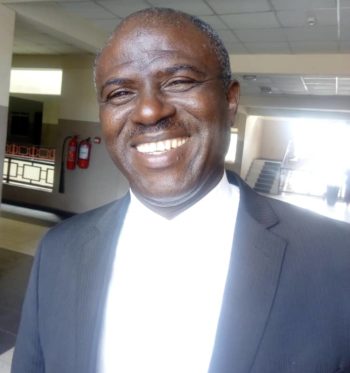
Lagos
Having perused the report on the social media bill, it is pertinent to assert the inappropriateness of this bill as the people at the helm of power cannot be trusted when they aren’t also upright with their ways. Effecting such law in a state that is plunged by bad governance will only further inhibit freedom of speech. Also, what’s the basis or yardstick for what information is right or wrong in a state as Nigeria that has no regard for its law and the leaders are full of deceit cum corruption? In simple terms, I consider this a threat to freedom of expression and the enactment of this law will only worsen the nation across other sectors such as our economy.

Lagos
No. The proposal of the social media bill by the Minister for Information shows that they are forgetting what is important. Social media has been one of the means through which the people express themselves on the fundamental issues of the country. If their acclaimed bill is accepted, the people’s voice won’t be heard and their right to freedom of speech will be completely jeopardised. There is no country in the world that would ever think of regulating social media because they see it as part of development. In fact, they do everything to improve on it but reverse is the case here. They want to clamp down on social media so as to be able to imprison people more. The social media bill is totally out of place.

Lagos
Like other well-meaning Nigerians, I recognise the fact that the social media which is a double-edged sword should be moderated in a way to ensure a more responsible, profitable and accountable use of it by all and sundry. However, I strongly assert that no such action should be taken in violation of the constitutional rights of Nigerians to freedom of expression within the law. Free speech should never be criminalized through legislative instruments that defy or duplicate already settled constitutional and legal provisions.

Benin
I urge the National Assembly not to listen to individuals and government affiliates clamouring for the passage of the bill into law. I know the reason why some politicians are pushing for the social media bill is because of the significant role the social media played in pushing the recent EndSARS protest to the world. The consistency of this obnoxious demand, especially at a time when Nigerians have been very vocal against police brutality and are demanding a better Nigerian police institution through the social media, has compelled citizens to immediately decry such demand as insensitive, retrogressive and anti-democracy. The overwhelming demand for police reform in Nigeria today is a product of the government’s insensitivity to the plight of Nigerians for a very long time. In the same way, any attempt to pass the social media bill will only further agitate the polity and widen the distrust of Nigerians towards the government. Social media remains a very crucial platform where citizens can engage the government. Considering recent events in the country, particularly the escalation of violence against peaceful protesters in Lekki, Lagos and other parts of the country, it has become extremely important for the Nigerian government to demonstrate its commitment to accountability to the people; and the social media remains a very crucial platform where citizens can lead such conversation. In addition, recent developments in the country proves that the social media is playing an invaluable role in deepening Nigeria’s democracy and promoting citizens’ demand for accountability, hence; a very important thing that government must do at this time is to ensure that any conversation about restricting freedom of speech is sharply considered a threat to Nigerians. I hope that the National Assembly would take the lead in demonstrating the government’s commitment to the Nigerian people in these trying times, and kill the social media bill once and for all, and make sure that a more democratic approach is employed to deal with fake news in the country.

Ajegunle
Social media is where Nigerians can express their opinions freely. The leaders clamouring for this need to drop the bills of ‘social media bill and hate speech’, which are open to vague and broad interpretations and impose incredibly harsh punishments simply for criticizing the authorities. There are many provisions in the bill that do not meet international human rights standards. For example, section 4 of the “hate speech” bill prohibits abusive, threatening and insulting behaviour, which is open to very wide interpretation. This section would pose a threat to critical opinion, satire, public dialogue and political commentary. The government is not meant to be focusing on this now. Their priority should be based on insecurity, joblessness, hunger and others.

Ado-Ekiti
Anti-social Media Bill was introduced by the Senate of the Federal Republic of Nigeria on 5 November 2019 to criminalise the use of the social media in peddling false or malicious information which the original title of the bill was Protection from Internet Falsehood and Manipulations Bill 2019 sponsored by Senator Mohammed Sani Musa. Several people went against it as civil society organisations, human rights activists, and Nigeria International rights group, Amnesty International among others saying the bill is simply a way of denying the citizens of their right to speak their minds which also means freedom of speech. You can recollect that the bill of hate speech was passed and it was also due to the support of the social media that makes people express themselves in order not to reveal their secrets and tell the government what to do and what not to do. This bill simply means the government is determined to handicap the citizens and do whatever they like freely without check and balance which invariably means the opposite of what we call democracy. Therefore, the bill should not be accepted because it disenfranchises the rights of the citizens which freedom of speech is one of them.

Imo
The way the politicians have been going about the power of social media and what it purports for Nigeria, one would think that we are a peaceful and prosperous country dealing with a looming threat. In reality, we are a poorly-run country with rapidly escalating poverty rates amid related issues of insecurity and restlessness. For our self-satisfied politicians to be screaming about the threat social media indicates while grievous evil occurs on their watch, shows their blatant disingenuity. The reason for the anti-social media bill is because of fake news which our leaders feel is being exposed to the world. They have not even defined “fake news” and how existing laws run short of managing false statements. What is fake news, and who defines it? Before the advent of the social media phenomenon, were there not “fake news” such as rumours, conspiracy theories, and campaign promises?
The second thing missing in their intervention is how they intend to regulate social media. Some of the governors said they want a “major control mechanism” and “censorship of the social media practice.” Social media is not a faucet that can be turned on and off at the whim of some bureaucrats invested with power to tell us when we have had enough; its strength is the democratisation of opinion-mongering. They cannot pre-empt its mischief; they can only punish people after any damage has been done. Meanwhile, there are already laws to that effect. How precisely can they control thought flows and on which of the social media apps? And how does a supposedly democratic country like Nigeria pull off that act?

Ibadan
The demand for the passage of the social media bill is insensitive, retrogressive and anti-democracy. The passage of the bill would further agitate the polity and widen Nigerians’ distrust of the government. Besides, the recent developments in the country had proved that social media is playing an invaluable role in deepening Nigeria’s democracy and promoting citizens’ demand for accountability. I believe the important thing for the government to do at this time is to consider any conversation about restricting digital freedom or freedom of speech as a threat to Nigerians and the civic space. I urge the National Assembly to take the lead in demonstrating the government’s commitment to the Nigerian people in these trying times, and kill the social media bill once and for all, and make sure that a more democratic approach is employed to deal with fake news in the country.

Kwara
Social media is a strong platform that can be used to sharpen discussions, even though it has negative sides. Millions of people make their daily living from social media, even when some people claim that it destroys. Millions of others are also learning from social media. The fact that there are few negative sides to it does not mean that there are no good sides. Undoubtedly, the positive side of social media outweighs the negative side.

Lagos
It is a welcome development. The government is not shutting it down but regulating it and I know people will benefit more from social media when it is regulated. There are so much fake news on social media and it sometimes instigates violence and if we are not careful it could cause havoc in the country. Hence, the need to regulate it.

Lagos
This bill is an assault on citizens’ right to freedom of expression. If passed into law, it would undermine the constitutional and internationally recognised right to freedom of expression and press freedom on the internet in the country. Freedom of expression entails the ability to both speak and receive information, including through the social media and other generated content. By initiating this bill, the Senate is impermissibly restricting the ability of the citizens to use these tools to communicate, connect and seek independent sources of information.

Ojo
The Social Media Bill and the Hate Speech Bill are the greatest threats to democracy and freedom of expression in the history of Nigeria. If the National Assembly makes the mistake of passing either or both of these two bills Nigerians will suffer the consequences for many generations to come and human rights, liberty and freedom will be a thing of the past in our country.
Copyright Ships & Ports Ltd. Permission to use quotations from this article is granted subject to appropriate credit given to www.shipsandports.com.ng as the source.